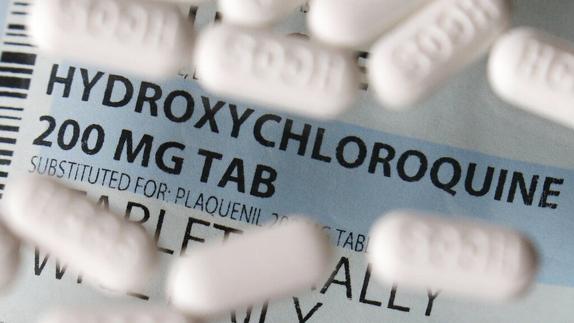 This April 6, 2020 file photo shows an arrangement of hydroxychloroquine tablets in Las Vegas. (JOHN LOCHER / AP)
This April 6, 2020 file photo shows an arrangement of hydroxychloroquine tablets in Las Vegas. (JOHN LOCHER / AP)
GENEVA - The World Health Organization has suspended testing the malaria drug hydroxychloroquine in COVID-19 patients due to safety concerns, WHO Director General Tedros Adhanom Ghebreyesus said on Monday.
Hydroxycholoroquine has been touted by Donald Trump and others as a possible treatment for the disease caused by the novel coronavirus. The US President has said he was taking the drug to help prevent infection.
The WHO has previously recommended against using hydroxychloroquine to treat or prevent coronavirus infections, except as part of clinical trials
“The executive group has implemented a temporary pause of the hydroxychloroquine arm within the Solidarity trial while the safety data is reviewed by the data safety monitoring board,” Tedros told an online briefing.
He said the other arms of the trial - a major international initiative to hold clinical tests of potential treatments for the virus - were continuing.
READ MORE: WHO to review its pandemic handling, vows transparency
The WHO has previously recommended against using hydroxychloroquine to treat or prevent coronavirus infections, except as part of clinical trials.
Dr. Mike Ryan, head of the WHO emergencies programme, said the decision to suspend trials of hydroxychloroquine had been taken out of “an abundance of caution”.
The World Health Organization also expressed appreciation to China's openness to join efforts to identify the source of the virus, and said that such a scientific mission should consist of "the right mix of scientific experts from a multinational perspective."
"We've been in discussions day-to-day with our colleagues in China about putting together the necessary scientific inquiries into the origin of the virus," Ryan said in a press conference in Geneva on Monday.
The World Health Organization also expressed appreciation to China's openness to join efforts by the international science community to identify the source of the virus
"I think the authorities in China, governments around the world and ourselves are very keen to understand the animal origin of the virus itself. And I am very pleased to hear a very consistent message coming from China, which is one of openness to such an approach," he added.
"So I think we will be very pleased to continue for those discussions. I don't believe there is a date yet for a scientific mission, but we will be looking forward to doing that as so on as possible and with the right mix of scientific experts from a multinational perspective to join such a team," he said.
Second wave
Countries where coronavirus infections are declining could still face an “immediate second peak” if they let up too soon on measures to halt the outbreak, the World Health Organization said on Monday.
The world is still in the middle of the first wave of the coronavirus outbreak, Ryan told an online briefing, noting that while cases are declining in many countries they are still increasing in Central and South America, South Asia and Africa.
Ryan said epidemics often come in waves, which means that outbreaks could come back later this year in places where the first wave has subsided
Ryan said epidemics often come in waves, which means that outbreaks could come back later this year in places where the first wave has subsided. There was also a chance that infection rates could rise again more quickly if measures to halt the first wave were lifted too soon.
“When we speak about a second wave classically what we often mean is there will be a first wave of the disease by itself, and then it recurs months later. And that may be a reality for many countries in a number of months’ time,” Ryan said.
ALSO READ: WHO chief says looking into Trump's letter, praises WHA
“But we need also to be cognizant of the fact that the disease can jump up at any time. We cannot make assumptions that just because the disease is on the way down now it is going to keep going down and we are get a number of months to get ready for a second wave. We may get a second peak in this wave.”
He said countries in Europe and North America should “continue to put in place the public health and social measures, the surveillance measures, the testing measures and a comprehensive strategy to ensure that we continue on a downwards trajectory and we don’t have an immediate second peak.”
Many European countries and US states have taken steps in recent weeks to lift lockdown measures that curbed the spread of the disease but caused severe harm to economies.


